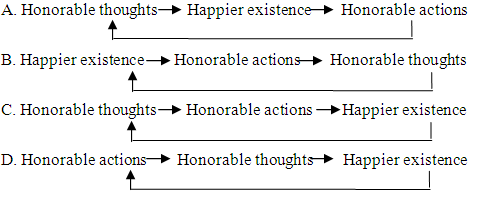Happiness through Honorable Actions
Do you want to live with a strong sense of peacefulness, happiness, goodness, and self-respect? The collection of happiness actions broadly categorized as “honor” help you create this life of good feelings.
Here is an example to show how honorable actions create happiness.
Say a store clerk fails to charge us for an item. If we keep silent, and profit from the clerk’s mistake, we would drive home with a sense of mean excitement. Later we might tell our family of friends about our good fortune. On the other hand, if we tell the clerk about the uncharged item, the clerk would be grateful and thank us for our honesty. We would leave the store with a quiet sense of honor that we might never share with another soul.
Then, what is it to do with our sense of happiness?
In the first case, where we don’t tell the clerk, a couple of things would happen. Deep down inside we would know ourselves as a type of thief. In the process, we would lose some peace of mind and self-respect. We would also demonstrate that we cannot be trusted, since we advertise our dishonor by telling our family and friends. We damage our own reputations by telling others. In contrast,
bringing the error to the clerk’s attention causes different things to happen. Immediately the clerk knows us to be honorable. Upon leaving the store, we feel honorable and our self-respect is increased. Whenever we take honorable action we gain the deep internal rewards of goodness and a sense of nobility.
There is a beautiful positive cycle that is created by living a life of honorable actions. Honorable thoughts lead to honorable actions. Honorable actions lead us to a happier existence. And it’s easy to think and act honorably again when we’re happy. While the positive cycle can be difficult to start, once it’s started, it’s easy to continue. Keeping on doing good deeds brings us peace of mind, which is important for our happiness.
小题1: According to the passage, the positive action in the example contributes to our ______.
| A.self-respect | B.financial rewards |
| C.advertising ability | D.friendly relationship |
小题2:The author thinks that keeping silent about the uncharged item is equal to ______.
| A.lying | B.stealing | C.cheating | D.advertising |
小题3:The underlined phrase “bringing the error to the clerk’s attention” means ______.
| A.offering advice to the clerk | B.telling the truth to the clerk |
| C.asking the clerk to be more attentive | D.reminding the clerk of the charged item |
小题4:How does the positive cycle work according to the author?
